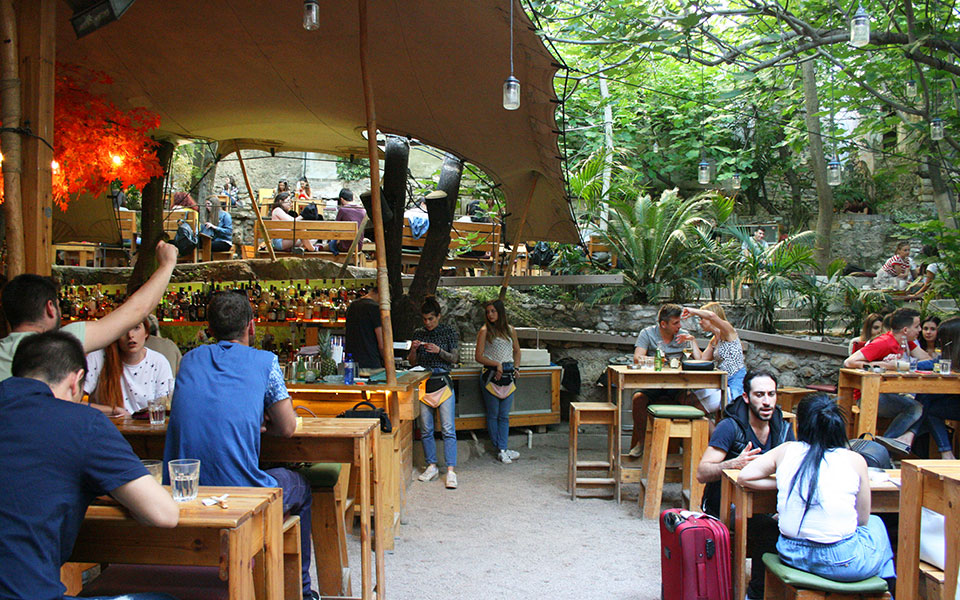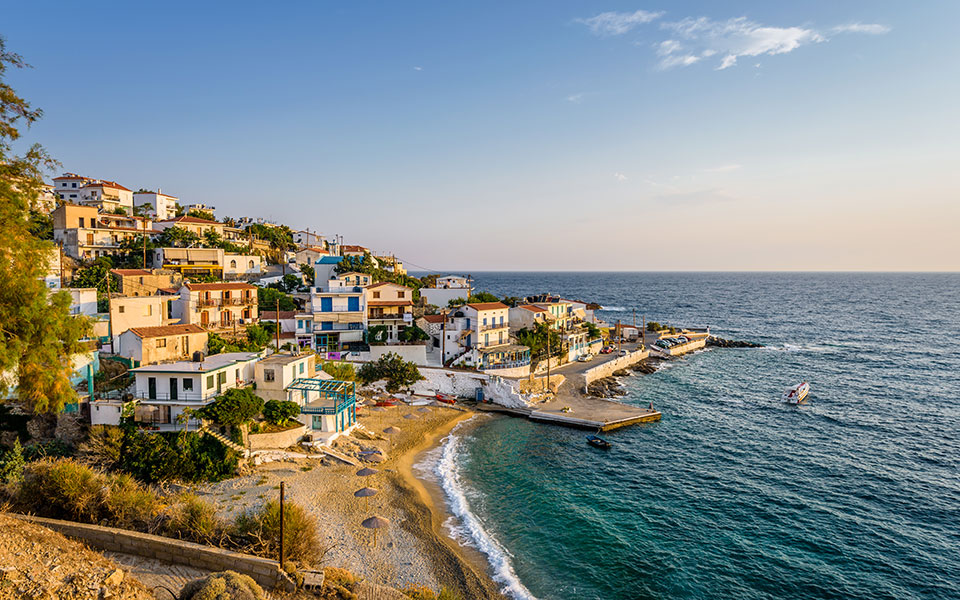Interwar Athens: A Journey Through Architectural Transformation
We join archaeologist and MONUMENTA coordinator...

New York Times journalist Charly Wilder on a beach in Greece
The name behind the New York Times travel piece “Athens Rising”, which was translated and went viral in Greece, belongs to a woman, though some of Greek commenters referred to her as a he. “I’m used to it,” says the 36 year old American journalist, Charly Wilder.
She visited Greece for the first time 12 years ago, as a tourist. She made Greek friends, and got to experience the city like a local. Shortly before her return to Greece in September, this time to vacation on Icaria, she shares her thoughts on the comments she got on the article, on Athens being referred to as the “new Berlin”, and what changes she would like to see in the city ten years from now.
What were the reactions and comments from your Greek and your non-Greek friends regarding the article and the Athenian “rebound” from the crisis?
The reactions to this piece were as a rule extreme, either positive or negative, which I think is generally a good thing if what you want as a writer is to affect and engage people. Luckily for my self-esteem, most were positive, saying that I had shown the city as it really is, good and bad, but emphasized its incredible resilience and energy. The negative reactions seemed mostly to be from non-Greeks who had spent time in Athens and felt my focus was too narrow, too concentrated on the gentrified center or on middle-class and creative-class Greeks on whom the crisis has not been as devastating as it has on the poor and working classes. I would just say that of course my perspective is necessarily limited, particularly as this was a cultural travel piece grounded in a personal narrative, but it was also a conscious decision to tell a certain part of this story. And I wish the people making snide comments about the sushi and poke bowl restaurants I visited would refrain from projecting their own narratives and consider the fact that these are all locally owned, locally staffed independent and family-run businesses.
Was the timing of the visit random or intended?
I had known I wanted to write about my early experiences in Athens at some point, and then I could see how the city was becoming this very relevant cultural hub at the same time that the Greek economy was showing signs of recovery, and it seemed to me like the perfect time to kind of widen the lens and look at the city over this period of 12 years from when I first visited in 2006, through the crisis, to now.

The garden at Six Dogs, the bar that sparks Wilder's memories in her New York Times piece.
© Paulina Kapsali
On your first backpacking trip from NY to Europe, was Greece the first stop? What was it that brought you here then?
Yes, not counting a stopover in Frankfurt, Greece was my first stop. I’m not really sure what brought me, other than that I had done one of those garden-variety Western Europe backpacking trips when I was 20, a whirlwind through Paris, Barcelona, Rome, Amsterdam, etc, and I wanted to go further east, further south, just further. Greece, and certainly Athens, were not the tourist magnets they are now, but of course there was also a sense of familiarity. In fact, as a child, I was obsessed with this illustrated book of Greek Myths my grandparents gave me. I don’t think this was a conscious factor, but I imagine it played in somewhere….
Is the Greek hospitality special? What’s memorable about it?
Of course there are so many other places that are rightfully known for their hospitality and I dislike making broad generalities, but I’ve never felt such an instant affinity as I did here. Of course you can go on forever about the food, the music, the history, but to me it really comes down to the people. It’s hard to explain but I once described it as this combination of innocence and the opposite of innocence. There’s an openness, a warmth, but also this nihilistic, cynical proclivity for chaos. If you were really pretentious, you could almost call it Dionysian.
Are you a city girl or an outdoor girl?
Must have both. I go crazy if I go too long without spending time in nature, but I refuse to live anywhere but in a city of 3 million plus.
Is there something you always seek out when you travel?
I so often travel on assignment with a very specific set of goals, that when I travel for pleasure, what I want more than anything else is just to wander, to get lost, to stumble onto something I never could have expected. That said, I’m a sucker for a great dive bar or an open-air market.

Ikaria
© Shutterstock
What was your experience of the Cycladic islands?
Always amazing, though that first visit was probably the least so, since I was really just there as a tourist, knowing no one and nothing about the islands. Since then, I’ve spent a lot of time in the Cyclades (and the Ionian and Dodecanese islands), often with Greek friends. This September I’ll be going back a second time to Ikaria, which is so wonderful and unique and not quite as overrun by tourists as a lot of the better known islands.
Where do you usually spend your down time, your summer vacation? Would you dedicate it to Athens?
To be honest, I rarely have a real vacation. I’m almost always traveling on assignment or visiting my family in the States. But the trip to Ikaria this September is a real vacation with friends, and we will spend a few days in Athens on our way home.
What do you think helped Athens endure, survive and rebound from the financial crisis?
It’s obviously a complex topic that can’t be answered in brief, but putting aside policy, I think the shortest answer is a combination of global tourism and the people’s ability to adapt, create and persevere in tough times.
Being a resident of Berlin who visits Athens regularly, what do you think of people calling Athens “the new Berlin” ?
Of course I understand where it’s coming from, but as weary as I am with this fetishized global-consumer caricature of Berlin that usually feels so out of sync with the city I know and love, I’m even less enthused by the idea of grafting this onto Athens. Particularly given the dynamics between the governments that reside in these two capitals and the wildly different social and political environments, it’s hard to see this comparison as anything other than a kind of gross, superficial manifestation of neoliberal aspiration.
What you think you’ll see and feel, and what do you wish to see when you come back to Greece in 10 years?
I’m sure the city will change in ways I can’t even imagine. I hope there will be greater social, political and economic stability, that the city will find a way to curb gentrification and keep the center affordable for locals. I hope there will be a humane resolution of the refugee crisis. I hope there will be more harmony within the EU and that the surge in far-right populism currently taking place not only in Greece but throughout the continent will be a bad and distant memory. I hope and expect that nothing will dampen the tremendous heart, spirit and creativity of the people of Athens.
We join archaeologist and MONUMENTA coordinator...
Tourists share the highs and lows...
A nexus of Hellenic research, the...
Amid neoclassical homes and narrow streets,...